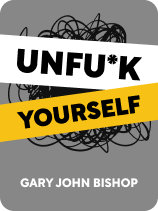

This article is an excerpt from the Shortform book guide to "Unfu*k Yourself" by Gary John Bishop. Shortform has the world's best summaries and analyses of books you should be reading.
Like this article? Sign up for a free trial here.
Want to learn some positive affirmations for change in life? How can you motivate yourself to take action?
According to self-help author Gary John Bishop, to truly achieve freedom from the thoughts that are holding you back, you must be open to changing your self-limiting thoughts and beliefs. In his book Unfu*k Yourself, he offers positive affirmations for change and taking action toward your goals.
Read on to learn Bishop’s positive affirmations for change and the best ways to apply them to your life.
Positive Affirmations for Change
According to Gary John Bishop, in order to pinpoint what’s prevented you from achieving your goals so far, you need to identify and transform any beliefs you have that might be holding you back. In his self-help book Unfu*k Yourself, he explains that being open to changing your beliefs is the first step to freedom. It involves a lot of deep reflection, and Bishop says you’ll need to make sure all parts of you, conscious and unconscious, are fully on board and ready to tackle the challenge. In this article, we’ll present three of Bishop’s positive affirmations for change that will guide you through an honest self-assessment and motivate you to take action.
Change Is Your Responsibility
Affirmation: “I am willing.”
Best used: To assert that you’re ready to change
Bishop first introduces the positive affirmation “I am willing,” telling us that willingness is an energized, empowered state from which you can take action to change. To reach this state, recognize that no matter what happens to you that you can’t control, you can always choose how to respond. Claiming that power includes accepting that your own choices have brought you to wherever you are today, and you can’t place the blame on other people or outside circumstances.
It can be hard to admit that part of what’s been holding you back is that you haven’t been willing to make changes. In some sense, Bishop says, you’ve chosen to end up here, and you have tolerated the status quo—otherwise, you would have already made changes. Ask yourself if you’re willing to do what it takes to get unstuck and go after your goals, and answer honestly. If you’re ready now, you can embrace the idea that you are responsible for your own life, and let that sense of agency motivate you to get going.
As an alternative, Bishop suggests that if it’s hard for you to feel enthusiasm for pursuing your goals, you can achieve the same results by focusing on your unwillingness to accept the status quo any longer. In this case, your drive and determination come when you decide you will not tolerate the way things are. Either way, the hope is you’ll be eager to take action.
| Responsibility Isn’t Blame Taking responsibility for your own life is a topic which, if not handled delicately, can cause feelings of anger, guilt, or self-hatred, as you realize that there’s no one but yourself to blame for where you’ve ended up. In The Subtle Art of Not Giving a F*ck, Mark Manson handles this in part by elaborating on the difference between blame and responsibility and how you can take responsibility for your actions without blaming yourself for things that aren’t your fault. One of the ways he draws this distinction is by asserting that blame exists in the past (how did this happen?) while responsibility exists in the present (it’s up to you what to do now). This echoes Bishop’s insistence on taking action in the present moment, and his reasoning for framing his affirmations in the present tense. |
On the other hand, if after careful reflection you discover that you’re not willing to do what it would take to change your life in a certain area, Bishop says that’s okay. In fact, consciously recognizing this can still help you feel better. Once you’ve acknowledged that the work to improve your situation is more than you’re prepared to do, you can stop wanting your life to be different and make peace with where you are. According to Bishop, this is particularly helpful if you struggle with jealousy or comparing yourself to others. What someone else has might be nice, but if you already know you’re not willing to do what it would take to get that for yourself, it can’t torture you anymore, and there’s no mystery of “why not me?”
| The Power of Self-Awareness “I am willing” is the first positive affirmation for change that Bishop introduces in the book, and we start with this one because Bishop’s discussion of it implies that confirming you’re willing to change in at least one particular area of your life is a necessary prerequisite before you can begin the work of self-improvement. Paradoxically, while Bishop frames this affirmation as, “I am willing,” in his explication he treats it as a question you need to ask yourself, to discover whether you’re willing to change or not. Examining your own level of willingness requires self-awareness. In contrast to Bishop’s assertion that this self-awareness can help you make peace with your unwillingness to change, others say that self-awareness tends to increase your willingness: When you’re clear-eyed about what’s holding you back, you’ll likely be more motivated to change. |
Your Brain Wants to Be Right
Affirmation: “I am wired to win.”
Best used: To motivate you to change your beliefs
According to Bishop, this positive affirmation serves to remind you that what you believe internally will determine the life you build externally, so you can change your circumstances based on your beliefs. By “wired to win,” Bishop means that our brains are set up to prove themselves right, subtly directing you to create a reality that confirms your unconscious beliefs. Therefore, in order to achieve the life you want, you’ll need to make sure you have the beliefs to match, even at the unconscious level.
| How to Break Your Unconscious Thought Patterns In Awaken the Giant Within, Tony Robbins also advises you on how to identify and transform your unconscious beliefs. Robbins goes into detail about how these beliefs form and promotes a process he calls Neuro-Associative Conditioning (NAC) to reshape these beliefs using the following six steps: 1) Determine what you want to change, and identify any pain or fear you associate with making the change. 2) Create a sense of urgency by focusing on what the negative consequences will be if you don’t change and the benefits you’ll gain if you do. 3) Any time you notice yourself falling into old patterns, disrupt them by doing something completely different. For example, if you realize that your thoughts are focused on self-doubt, stop and give yourself a big hug. 4) Create a new positive pattern that brings you as much satisfaction as the old one. 5) Reinforce your new pattern by visualizing and rehearsing that behavior in your mind. 6) Test the strength of your new habit by challenging it to see how you react: Put yourself in a situation that used to trigger your old pattern, and notice if you have the urge to act according to the old pattern or the new one. |
It Is What It Is (Not What It Should Be)
Affirmation: “I expect nothing and accept everything.”
Best used: To challenge your expectations
This positive affirmation for change addresses another aspect of our unconscious mind that plays a big role in how we relate to our lives—our expectations. Without being aware of it, we hold expectations about what should happen or how we thought things would go, and we’re constantly comparing reality to that ideal.
Again, Bishop instructs, consider an area of your life that isn’t going well, and you may discover that your dissatisfaction is a result of expectations you’re unaware you were holding. He recommends writing down what you thought this part of your life would look like, and then writing down a description of how it actually is. The gap between the two is most likely what’s making you unhappy.

———End of Preview———
Like what you just read? Read the rest of the world's best book summary and analysis of Gary John Bishop's "Unfu*k Yourself" at Shortform.
Here's what you'll find in our full Unfu*k Yourself summary:
- How your mind works and how you can use its power to your advantage
- Why your subconscious mind is actually the one calling the shots
- The seven phrases you can use to reshape your thoughts






